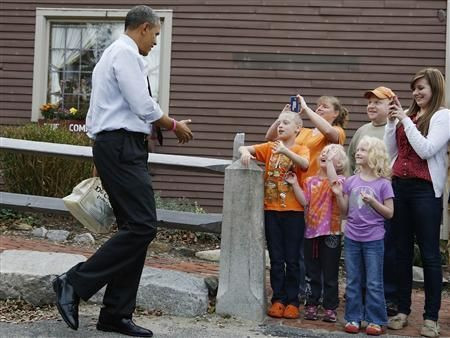
President Barack Obama and Republican challenger Mitt Romney campaigned feverishly in closely contested battleground states on Saturday but changed travel plans to avoid Hurricane Sandy, the massive storm approaching the U.S. East Coast.
With just 10 days before Election Day and polls showing the national race a dead heat, Romney held three rallies in Florida, whose 29 electoral votes are the biggest prize among states considered too close to call.
Romney told supporters in Pensacola that Obama was focusing his campaign on small things, and vowed to win the election, to chants of "10 more days, 10 more days."
"Look into the future and see the debt that's being amassed and say, 'What is right for America?' This is a time of big choices, of big consequence. It's a big election," Romney said.
Romney's events in Florida came on the first day of in-person early voting in the state. In 2008, Obama benefited from the strong turnout of Democrats in early voting. Republicans have made a push to get Romney supporters to vote early in 2012.
Republican Senator Marco Rubio, traveling with Romney in Florida, told reporters on the campaign plane that the Republican get-out-the-vote effort in his state was much better than in 2008.
"The best way to put it is, in Florida, I'd rather be us than them," said Rubio, who later left the campaign trail after his 12-year-old daughter was injured in an accident in Miami.
Obama spent Saturday in New Hampshire, whose four electoral votes could make a difference in the tight race.
"Ten days, New Hampshire, 10 days and you'll be stepping into a voting booth and making a defining choice about the future of our country," the Democratic president told about 8,500 people in a speech criticizing Romney's record on taxes and fees as governor of Massachusetts.
New Hampshire is known for its low taxes. Many of its residents moved away from Massachusetts to cut their tax bills.
Both campaigns were keeping a wary eye on Hurricane Sandy, which threatened to slam into the eastern third of the country on Monday or Tuesday with torrential rains, high winds, major flooding and power outages.
In Kissimmee, Romney told the crowd to keep those in the path of the storm "in your mind and in your hearts. You know how tough hurricanes can be."
CHANGE OF PLANS
Romney canceled a trip to Virginia scheduled for Sunday, when the state is expected to begin feeling the impact of the approaching storm. A Washington Post poll on Saturday showed Obama leading Romney by 51 percent to 47 percent among likely voters in Virginia, just above its margin of error of 3.5 percentage points.
Romney will go instead to Ohio for appearances with Paul Ryan, his vice presidential running mate. Most polls give Obama a slim lead in Ohio, which has 18 electoral votes.
Obama canceled a campaign stop with former President Bill Clinton in Virginia on Monday as well as a trip to Colorado Springs, Colorado, on Tuesday because of the impending storm.
"The president is being regularly updated on the storm and ongoing preparations, and he has directed his team to continue to bring all available resources to bear as state and local partners continue to prepare for the storm," White House spokesman Jay Carney said in a statement.
With widespread concern that power blackouts in Sandy's wake could interfere with early balloting, lines at early voting stations stretched for blocks at some polling stations in Maryland, which began early voting on Saturday.
Polling sites in Virginia were also busy.
Eager to avoid any complaints that campaigning distracts from handling a potential natural disaster, the White House pointed out that Obama was briefed about Hurricane Sandy on board Air Force One as he traveled to New Hampshire.
"This is an example yet again of the president having to put his responsibilities as commander in chief and as leader of the country first while at the same time he pursues his responsibilities as candidate for election," White House spokesman Josh Earnest told reporters.
In such a close election, Obama does not want to be seen mishandling Sandy. White House officials are keenly aware of the severe criticism that President George W. Bush received for failing to react quickly to Hurricane Katrina in 2005.
Obama and Romney are in a late sprint to ensure that their supporters get out to the polls and to win over the dwindling pool of undecided voters in the eight or so battleground states where the election will be decided.
They remained in a statistical dead heat on Saturday in the daily Reuters/Ipsos online tracking poll. Obama led Romney by 47 percent to 45 percent, within the survey's credibility interval.
The poll also showed that support for the candidates was solidifying. Almost nine out of 10 of registered voters now say they will definitely vote for their candidate, leaving just 12 percent who say they could change their minds.
In contrast, an average of about 15 percent last week said they might still switch.
But more and more voters have already taken advantage of early voting programs and cast their ballots. Eighteen percent of respondents in the Reuters/Ipsos poll said their votes were in.
The U.S. election is not a true national poll, but a state-by-state contest in which 538 electoral votes are divided among the 50 states and Washington, D.C., roughly according to population.
With the majority of states solidly either Republican or Democratic, the fight for the "swing states" not firmly tied to either party is hugely important.
This year, there is a possibility one candidate could take enough states to win the electoral vote - and thus the White House - while trailing in the nationwide popular vote.
That last happened in the bitterly contested election of 2000, when Democrat Al Gore won half a million more votes nationally than Bush, but the Republican won the presidency because he ended up with more electoral votes.
© Thomson Reuters.




